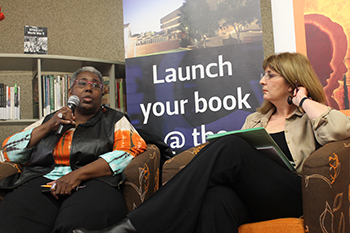Latest News Archive
Please select Category, Year, and then Month to display items
11 September 2024
|
Story Anthony Mthembu
|
Photo Anthony Mthembu and Chelsea Carolus
 From the left: Geraldine Lengau, Senior Officer in the Unit for Institutional Change at the UFS; and Oratile Reina, West College Prime.
From the left: Geraldine Lengau, Senior Officer in the Unit for Institutional Change at the UFS; and Oratile Reina, West College Prime.
As part of the initiatives lined up for College Week, the student leaders of West College at the University of the Free State (UFS) hosted a dialogue that primarily focused on discussing social justice as a value of Vision 130. The dialogue was held at Outeniqua Residence on 3 September 2024 and was well attended by students within West College.
According to Oratile Reina, West College Prime, “the motivation for the dialogue was to prepare newly elected leaders and our college community to align their efforts with Vision 130 – a vision that aims to create a more inclusive, equitable, and socially just environment on campus”. As such, she highlights that the dialogue was an opportunity for leaders to discuss practical strategies for implementing these values in their respective spaces, and to encourage those in West College to become better citizens inside and outside the university.
A conversation on social justice
The dialogue was facilitated by Geraldine Lengau, Senior Officer in the Unit for Institutional Change and Social Justice at the UFS. Lengau touched on several aspects pertaining to the topic of discussion. Firstly, she allowed the audience to give their definition of social justice, especially as students within the institution. In addition, she went on to talk to the audience about sexual assault in the context of social justice. In this instance, Lengau gauged whether the students knew which processes to follow in the event of a sexual assault incident, and whether they were acquainted with the UFS Sexual Harassment, Sexual Misconduct, and Sexual Violence Policy. Furthermore, the audience was given the opportunity to outline what social justice looks like to them in the spaces they occupy, including in their respective faculties, the sports they play, and the leadership structures they form part of. “I was encouraged to see that students take their right to a socially just university in very high regard, and that they were willing to break it down from what Vision 130 proposes, in order to align it with their common understanding,” said Lengau.
As the dialogue concluded, the audience signed a pledge committing to uphold the values of Vision 130. According to Reina, “The pledge represents a promise to take concrete steps towards fostering an inclusive and equitable campus culture. By signing the pledge, the leaders are not only agreeing to embody these principles in their leadership roles but are also holding themselves accountable to their peers and the broader university community.”
Africa’s lost voice during the Second World War echoes throughout book
2016-08-24

Prof Judith Byfield and Prof Heidi Hudson at the
book launch of Africa and Second World War at the
UFS Sasol Library.
Photo: Rulanzen Martin
If you pick up any historical record on the Second World War, you would see that, to a large extent, Africa has been missing from the history pages until now.
Africa and the Second World War (WW II) is a book edited by Prof Carolyn Brown from Rutgers University and Prof Judith Byfield from Cornell University in the United States. The book is the outcome of various papers presented during a workshop at Rutgers University and at a conference on WWII hosted at Cornell University.
The co-editors of the book were invited by Prof Jonathan Jansen, Vice-Chancellor and Rector of the University of the Free State (UFS), to launch the book at the UFS. The Centre for Africa Studies at the university, in collaboration with the UFS Sasol Library, presented the launch on Tuesday 16 August 2016.
Bestowing honour upon Africa’s role during WW II
Many people do not know that WW II started in Ethiopia with the Italian Invasion. This is generally omitted from discussions or complete histories of WW II. The present book explores the experiences of male and female combatants, peasant producers, women traders, missionaries, and sex workers during the war. “Many people are not aware that Africa produced most of the mineral and agricultural during the war,” said Prof Brown.
Book to reach a greater audience for discussion
The co-editors hope that the book reaches people who teach WW II history, as many talk about only the nationalist movements. “The opening of the book also talks about the importance of South Africa during WW II,” said Prof Byfield. The authors hope that people will read the book to start thinking comparatively about the war.